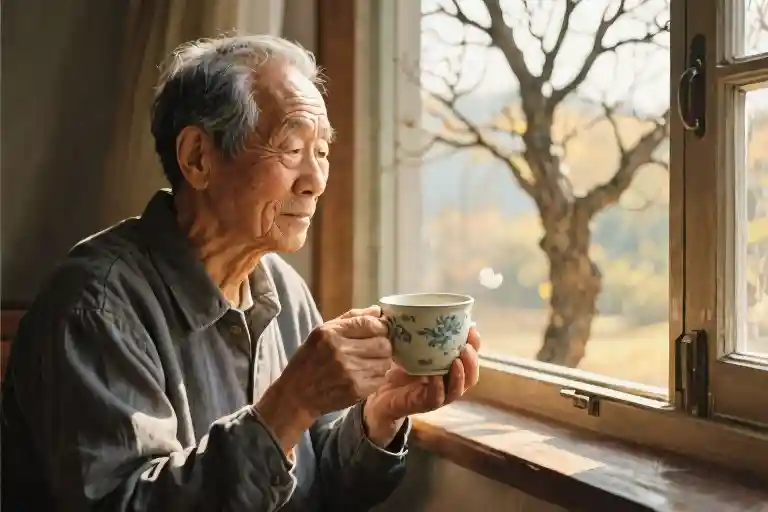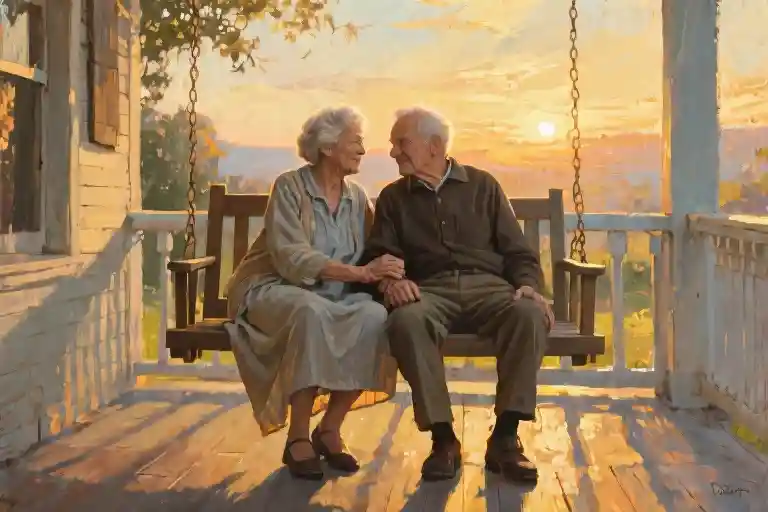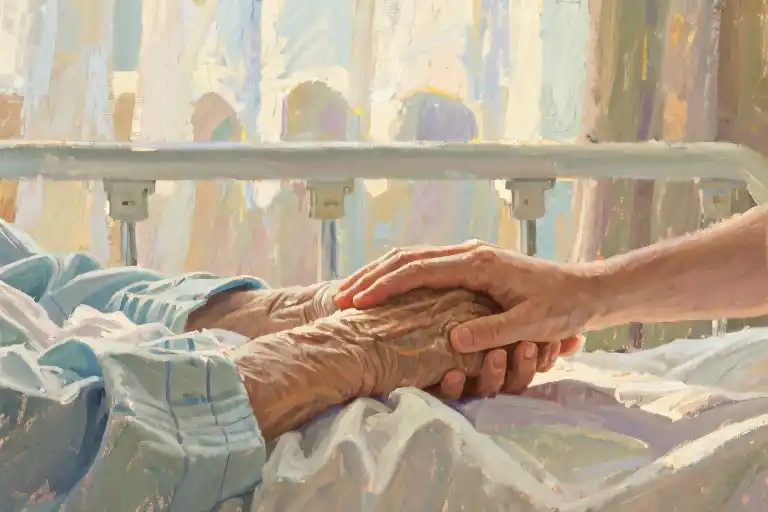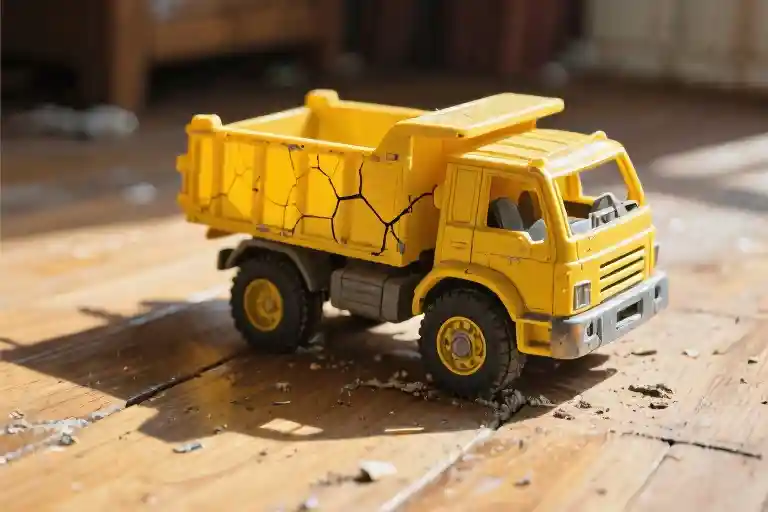The house smelled of old paper and weak tea. My father sat by the window, his once decisive hands now resting motionless on the arms of his chair. Outside, a stubborn oak tree that had survived three typhoons stood leafless in the winter light – a mirror to the man who used to sign documents that determined vaccine distributions for entire provinces.
His phone lay silent on the side table, its black screen reflecting the ceiling. I remembered when that device would overheat from constant calls, when district nurses and junior ministers would line up outside this very living room waiting for five minutes of his attention. Now the only interruption came from the clock’s ticking, each second measured and lonely.
Two years since my mother’s death, the silence had grown teeth. It bit into the spaces between his sentences, gnawed at the edges of his daily routines. He still woke at 5:30 AM out of forty years’ habit, but instead of reviewing briefing papers, he read the obituaries first – not with morbidity, but with the quiet recognition of someone keeping track of departures.
‘How do you stand it?’ I finally asked, watching his face for signs of irritation at my clumsy question. The words left my mouth before I could polish them. ‘The quiet. The… not being needed anymore.’
He turned from the window slowly, the way old people do when movement requires negotiation with pain. What surprised me wasn’t the sadness in his eyes, but its absence. Instead, there was something like relief – the look of a man who’d stopped pretending.
‘You think this is loneliness,’ he said, tapping the windowpane. ‘I call it accuracy.’
Outside, a neighbor’s child rode a bicycle in circles, laughing at nothing in particular. My father watched with the concentration of someone deciphering a code. ‘When the noise stops,’ he continued, ‘you finally hear what was always there.’
The refrigerator hummed. Somewhere in the village, a dog barked twice and gave up. I realized this wasn’t just a house without conversation – it was a life without echo. My father had become the sole witness to his own existence.
He reached for his teacup, the gesture still carrying traces of bureaucratic precision. ‘They took away my office,’ he said, ‘but they couldn’t take away the thirty years of mornings when I knew exactly why I was getting out of bed.’
A car passed by, its stereo blaring pop music that faded as quickly as it came. My father smiled at the sudden noise like it was an old friend who’d overstayed their welcome. ‘You don’t stay strong,’ he said at last. ‘You stop confusing strength with being needed.’
The admission hung between us, fragile as the dust motes floating in the afternoon light. I thought of all the retirement planning guides that never mentioned this – the unlearning required to stop measuring your worth by how many people wait for your signature.
The Silence After the Storm
The leather-bound planner on my father’s desk still holds the indentation of his fountain pen. For thirty-seven years, that pen authorized vaccine shipments, staff promotions, and outbreak responses. Now it gathers dust beside a stack of unopened mail. At 7:15 each morning – the same time he once reviewed daily briefings – he methodically smooths the yellowed pages of yesterday’s newspaper, though no one will quiz him on its contents.
Retirement didn’t come suddenly. The transition began with fewer evening calls, then empty slots in his meeting calendar, until one Tuesday he realized no one had asked for his opinion in fourteen days. Studies from the Journal of Gerontology show this isn’t uncommon – retirement correlates with a 63% decline in spontaneous social contact within the first year. What the data can’t capture is the particular silence of a phone that once rang through dinner, now resting mute beside his reading glasses.
During my visit, I found his last official memorandum tucked inside a cookbook my mother used to love. Dated three months before mandatory retirement, the document bore his characteristic green ink signature and a coffee ring stain. He’d preserved it with the care some reserve for love letters, though its contents merely approved budget reallocations. That’s when I understood – the paper wasn’t important. It was proof that his decisions once rippled through hospitals and clinics, that signatures could set things in motion.
The house tells the rest of the story. The guest chairs in his study, worn from years of petitioners, now support piles of library books. His former secretary’s birthday still appears in his address book, though they haven’t spoken since the farewell luncheon. Even the wall clock seems to have slowed, its ticks no longer measured against appointment times.
This is how aging announces itself – not with dramatic exits, but through gradual absences. The meetings evaporate first, then the requests for advice, until one morning you realize the world has quietly learned to turn without you.
How Do You Stay Strong?
The question hung between us like dust particles in the afternoon light. My father shifted in his armchair, the leather creaking under his weight. Outside, a neighbor’s dog barked at nothing in particular.
“First,” he said, wiping his glasses with the edge of his shirt, “you stop waiting for the phone to ring.” His voice carried no bitterness, just the quiet certainty of someone who’d counted all the costs. The landline on the side table hadn’t made a sound in three days. I suddenly remembered how its shrill ring used to interrupt our dinners when I was a child.
He explained it in terms that surprised me with their clarity. “Social roles are like coats,” he said. “Some keep you warm for decades, then one day you realize they’ve grown too heavy. But taking them off feels like standing naked in winter.” The metaphor struck me – this from a man who’d spent his career dealing in medical reports and policy briefs.
Psychology calls this the socioemotional selectivity theory, though Dad would never use that phrase. As we age, our social networks naturally shrink, not from neglect but from a refined understanding that time is finite. My father had arrived at this conclusion through lived experience rather than textbooks. He described watching former colleagues become bitter, their conversations stuck in endless loops of “back when I was…” One man in particular haunted him – a district supervisor who still carried his old business cards, handing them out to confused cashiers and waitresses.
“The tragedy isn’t losing your position,” Dad said, watching a sparrow land on the windowsill. “It’s making your former position the hero of every story you tell.” He’d taken to writing small observations in a notebook – the way light changed on the wall at 4 PM, the number of different birds that visited his feeder. These became his new metrics of importance.
What emerged over those four days wasn’t a prescription for happiness, but something more honest – a map of tolerable sadness. He spoke of grief as one might describe an old house: you learn where the floorboards creak, which windows stick in humid weather. The pain doesn’t disappear, but you develop a practical familiarity with its architecture.
When I asked about Mom’s absence, he showed me her favorite jade plant. “I water it every Tuesday,” he said, running a finger along its waxy leaves. “But I don’t fuss over it. Some things need attention; others need to be left alone.” The plant was thriving in its own stubborn way, just as he was.
Strength, I realized, wasn’t about building walls against loneliness. It was about developing the discernment to know when to let the quiet in, and when to walk out into the sun despite it.
The Unlearning Process
My father’s hands used to sign documents that determined vaccine allocations for entire districts. Now they fumble with charcoal sticks, smudging the edges of a half-finished sketch of the mango tree outside his window. The drawing looks nothing like the tree. ‘Third attempt this week,’ he says, holding the paper at arm’s length. ‘The leaves keep turning out like potatoes.’
This is what unlearning looks like – a former public health administrator measuring his days by failed sketches and the migration patterns of black ants across his kitchen counter. He keeps a notebook documenting things that would have seemed trivial in his previous life: the accuracy of the village weatherman’s predictions (62% last month), the number of different bird calls he can distinguish before sunrise (four, possibly five).
‘When they stop needing your signature,’ he told me while erasing yet another botched tree branch, ‘you start noticing how many ways there are to be useless beautifully.’ The charcoal dust settled into the wrinkles of his hands like tiny tattoos of imperfection.
We developed an informal test during my visit, a game really, to measure how well he’d detached from his old identity:
- When the grocer calls you ‘Doctor Sahib’ instead of your retired title, do you:
a) Politely correct him
b) Let it go but feel a twinge
c) Realize you’ve forgotten your own official designation - Finding old work photos, do you:
a) Organize them chronologically in albums
b) Use them as bookmarks
c) Notice how the young man in the pictures seems like a distant relative - Hearing about current health policies, do you:
a) Draft unsolicited improvement memos
b) Discuss alternatives with fellow retirees
c) Wonder why you ever cared about bureaucratic formatting rules
Father scores mostly C’s these days, though sometimes a B slips in when monsoons make his joints ache with memories of office deadlines. His sketchbook fills with crooked trees and lopsided birds, each page a testament to the dignity of doing things badly for no reason at all.
Near the end of my visit, I found him staring at a particularly abstract attempt at drawing our old family dog. ‘Remember,’ he said without looking up, ‘it took me twenty years to learn how to be important. Might take twenty more to learn how to stop.’ The afternoon light caught the charcoal smears on his fingertips, turning them into strange new fingerprints.
Grief as a Companion
The potted jasmine by the windowsill had outgrown its container years ago. Its roots pressed against the ceramic walls, visible through the drainage holes in tangled knots. Yet my father refused to repot it. ‘Your mother planted this the year we married,’ he said, running a finger along the cracked rim. ‘It knows its boundaries.’
There’s an unspoken vocabulary to loss that emerges after the first year of mourning. The dramatic gestures of grief – the untouched bedroom, the preserved clothing – gradually give way to quieter negotiations. My father developed an entire ecosystem of these subtle compromises. He kept Mother’s favorite radio station playing softly during breakfast, but changed the channel when the news ended. He still prepared two cups of tea every evening, though one now sat cooling beside his reading glasses until bedtime.
Research from Bereavement Care suggests months 18 through 24 often mark the depression peak for surviving spouses. This aligns eerily with my father’s timeline. During my visit, I noticed how he’d begun treating grief not as an intruder to be expelled, but as a permanent housemate. ‘You don’t make friends with it,’ he corrected me when I used the word ‘acceptance.’ ‘You learn its routines. My sadness always visits around sunset – so I water the plants then. The drips cover the sound if I talk to her.’
His approach mirrors what psychologists term ‘continuing bonds’ theory. Where traditional grief models emphasized detachment, contemporary studies recognize the healthy maintenance of connection. The jasmine became his living metaphor – neither uprooted nor constrained, but allowed to grow within inherited limits. He pruned dead branches religiously, yet never staked the new shoots that sometimes bent awkwardly toward the light.
We found unexpected comfort in the practical remnants of caregiving. Sorting through Mother’s sewing box one afternoon, we discovered three unfinished embroidery hoops. ‘She always hated leaving things incomplete,’ Dad chuckled, threading a needle with shaking hands. That night, we sat together attempting cross-stitch, producing laughably crooked flowers that somehow felt more sacred than any perfect memorial.
What surprised me most wasn’t his vulnerability, but the precision with which he’d mapped its terrain. He knew exactly which supermarket aisle still triggered panic (the cereal section, where Mother would debate oatmeal brands), and which brought comfort (the floral department where she’d always buy discounted carnations). He’d developed avoidance strategies and confrontation rituals with the meticulousness of a general preparing for long-term siege.
‘Grief isn’t a guest,’ he said on my last evening, watching the jasmine tremble in the breeze. ‘It’s the tenant who moves into the spaces she left. Sometimes we argue over decorating rights.’ The analogy stuck with me – this vision of mourning as an ongoing interior design project, where the living and the lost gradually negotiate shared living quarters.
Now when I call, I no longer ask if he’s ‘doing better.’ Instead we compare notes on the jasmine’s progress, its stubborn refusal to conform to horticultural expectations becoming our shared language for resilience. Last week it bloomed unexpectedly in November, filling the house with the scent Mother loved. ‘See?’ Dad whispered over the phone. ‘Some things still know how to surprise us.’
What the Living Can Do
The chair creaks when he leans forward to adjust his hearing aid, a sound that’s become more familiar than his office phone ringtone ever was. My father’s hands, once swift with signing documents, now move deliberately to pour tea for us both. It’s in this quiet kitchen that I realize resilience isn’t about grand gestures—it’s built through these small, shared moments.
The Art of Asking Better Questions
We’ve all fallen into the trap of transactional check-ins: “Did you take your pills?” “How’s the weather there?” These questions create conversational dead ends. My father taught me to ask instead: “Which plant surprised you most this week?” or “What memory made you smile today?” This shifts from monitoring to meaningful connection. Research from the University of Michigan shows open-ended questions increase elderly engagement by 40% compared to closed queries.
The Power of Parallel Presence
Sometimes companionship means doing separate activities together. I’d bring my laptop to work at his dining table while he sorted old photos. The silence wasn’t awkward but comfortable—like when he used to review files while I did homework as a child. Gerontologists call this “co-presence,” proven to reduce loneliness without the pressure of constant conversation.
Rebuilding Social Scaffolding
When professional identity fades, social circles often shrink. Together, we:
- Resurrected his old address book to reconnect with three retired colleagues
- Found a weekly poetry discussion group at the local library
- Set up a simple video call system with his grandchildren
The key was starting small—one social commitment monthly, not an overwhelming schedule.
Navigating the Medication Minefield
Rather than nagging about missed doses (which increases resistance), we created a neutral system: a weekly pill organizer placed next to his favorite coffee mug. He maintains autonomy while I discretely check refills during visits. The Johns Hopkins Elder Care protocol emphasizes this balance between safety and independence.
Legacy Projects That Matter
Sorting through decades of paperwork felt overwhelming until we focused on specific legacy questions: “Which policy are you proudest of?” “What advice would you stamp on every health official’s desk?” This transformed administrative fatigue into meaningful reflection. Now he’s compiling brief memoirs for each grandchild about lessons from different career stages.
When to Step Back
There’s wisdom in recognizing which battles don’t need fighting. The expired condiments in his fridge? Probably harmless. That he wears mismatched socks? Pure charm. As dementia specialist Dr. Olivia Kensington notes, “Preserving dignity sometimes means allowing harmless quirks.”
The Gift of Practical Presence
Instead of asking “How can I help?” (which puts the burden on them to delegate), I:
- Replaced flickering lightbulbs during casual visits
- Organized digital family photos with him as curator
- Arranged grocery deliveries to coincide with my calls
These concrete actions built trust for harder conversations later.
What surprised me most wasn’t what my father needed from me, but what he didn’t—no dramatic interventions, just consistent, attentive presence. As he said while pruning roses one morning: “You don’t need to fill the silence. Just don’t let it become empty.”
The Art of Non-Question Conversations
My father’s hands trembled slightly as he poured tea, the steam rising between us like the unspoken words of all our previous conversations. For years, I’d filled our visits with practical questions – ‘Did you take your pills?’ ‘When was your last checkup?’ – believing I was showing care through interrogation. That week, I learned how those well-intentioned questions built walls instead of bridges.
‘You know,’ he said after a long silence, ‘your mother never asked about my blood pressure. She’d tell me about the neighbor’s new puppy instead.’ The observation hung in the air, revealing what decades of medical training hadn’t taught me about emotional connection.
We developed an alternative approach that week, one I’ve since seen transform relationships between adult children and their aging parents. The shift isn’t about talking less, but about redirecting focus from problems to presence.
The Problem With Problem-Solving
Most conversations with elderly parents follow a predictable pattern:
- Health inquiries (‘How’s your arthritis today?’)
- Logistics (‘Did you pay the electricity bill?’)
- Reminders (‘Don’t forget your 3pm medication’)
While practical, this constant troubleshooting reinforces two damaging perceptions: that aging is primarily about decline, and that the parent-child relationship has shifted to caregiver-patient dynamic. My father described it as ‘being interviewed by a very concerned journalist every day.’
Research from the University of Michigan’s Gerontology Center shows that older adults engaged in problem-focused conversations report 23% higher feelings of burden compared to those enjoying experience-based dialogues. The distinction seems small, but the emotional impact is profound.
Rewriting the Script
We began practicing what I now call ‘landscape talking’ – conversations that wander like a country path rather than marching toward specific information. Some examples from our week together:
Instead of: ‘Did you take your heart medication today?’
We’d say: ‘The sunlight through your bedroom window this morning looked like liquid gold. What did you notice when you woke up?’
Instead of: ‘You shouldn’t be lifting heavy groceries.’
We’d discuss: ‘I saw the most determined squirrel trying to open a walnut outside. It reminded me of that time we…’
This approach yielded unexpected discoveries – my father’s newfound fascination with cloud formations, his secret notebook of bird sightings, the way he’d begun naming the spiders that built webs outside his kitchen window.
The Three Shifts
- From Interrogation to Observation
Lead with what you notice rather than what you need to know. ‘Your tomato plants have doubled in size’ opens differently than ‘Did you remember to water the garden?’ - From Present to Past-Present Blend
Bridge generations with shared memories. ‘This rain smells like the storms we’d get during our Cape Cod vacations’ invites connection without demanding recall. - From Solutions to Wonderings
Replace advice with curiosity. ‘I wonder what the crows are building with all those twigs’ works better than ‘You should put out a bird feeder.’
The University of Copenhagen’s longitudinal study on intergenerational communication found that families who adopted these practices reported 40% fewer conflicts about caregiving within six months. More remarkably, adult children reported discovering new dimensions of their parents’ personalities they’d never known before.
When Silence Speaks Louder
One afternoon, we sat for nearly an hour watching sunlight move across the living room floor, commenting occasionally like spectators at a slow-motion sporting event. That shared quiet – something I would have previously rushed to fill with questions – became our most meaningful conversation of the day.
My father later remarked, ‘You used to talk to me like I was a project you needed to manage. Now you talk to me like I’m still me.’ The observation stung with truth. In our zeal to care for aging parents, we often stop caring with them.
The phone calls continue now, but differently. Sometimes we discuss the philosophical implications of the ants that march across his patio each afternoon. Other times we simply listen to each other breathe. The pills still get taken, the bills still get paid – but these things have found their proper place in the larger conversation of our relationship, rather than constituting its entirety.
What the Living Can Do
The hardest lessons often come wrapped in ordinary moments. That afternoon, I found my father struggling with his weekly pill organizer, his fingers fumbling with the tiny compartments. My instinct was to take over – to sort his medications, to set reminders on his phone, to solve the problem. But something in the way he gently pushed my hand away taught me more about aging than any advice could.
‘If you do everything for me,’ he said, measuring each word, ‘what’s left for me to do?’ His words hung between us, exposing the delicate balance between care and autonomy. This is the tightrope every child of aging parents walks: how to be present without encroaching, how to help without diminishing.
The Art of Strategic Assistance
True support begins with understanding what not to do. Rather than taking over tasks completely, we can create frameworks that preserve dignity while ensuring safety. That pill organizer became our first lesson. Instead of managing his medications, I began simply reorganizing the empty box every Sunday evening – leaving the actual filling to him. When he occasionally missed a dose, we’d discuss solutions together rather than implementing my unilateral fixes.
This approach extends beyond physical care. Emotional support often falters when we mistake presence for pressure. The well-intentioned ‘How are you really feeling?’ can feel like an interrogation to someone adjusting to solitude. My father taught me the power of parallel presence – reading together in silence, watching his favorite old films without commentary, sometimes just washing dishes side by side. These unforced moments created more openings for genuine connection than any forced heart-to-heart.
Communication That Doesn’t Chafe
We’ve all endured those stilted calls that circle the same questions: ‘Did you eat?’, ‘Did you take your pills?’, ‘How’s the weather?’ My father called these ‘obligation volleys’ – the back-and-forth that satisfies our need to connect without actually connecting. Together, we developed what he jokingly called ‘conversational aikido’ – gentle redirections toward more meaningful exchanges.
Instead of asking about medications, I might say, ‘I heard they’re changing the formula for that blood pressure pill – remember when you had to recall those contaminated antibiotics in ’92?’ This pivot honored his expertise while sparking genuine engagement. We compiled lists of these transitional questions, each tailored to his interests and history.
The Gift of Purposeful Incompleteness
Perhaps the most counterintuitive lesson was learning to leave things unfinished. I noticed how my father would deliberately leave his crossword half-done or his garden project partially completed. ‘Gives me something to look forward to tomorrow,’ he explained. This became our guiding principle – always ensuring there were loose threads he could pick up independently.
Now when I visit, I might start organizing family photos but stop midway, leaving obvious gaps for him to fill. I’ll plant annual flowers but ‘forget’ to water them, knowing he’ll take over. These purposeful omissions maintain his sense of agency while keeping me connected to his daily life.
Building Bridges, Not Dependencies
The international senior pen pal program became our unexpected lifeline. Rather than worrying about his limited social circle, we focused on what he could offer others. His decades of public health experience made him an invaluable correspondent for young medical students abroad. This reciprocal relationship – where he felt genuinely needed rather than passively supported – did more for his emotional resilience than any intervention I could impose.
Watching him carefully craft letters about disease outbreaks he’d managed, I realized we’d been asking the wrong question all along. It wasn’t ‘How can I help my aging parent?’ but ‘How can I help my parent continue to help others?’ That subtle shift made all the difference.
In the end, the most meaningful support often looks like restraint. It’s in the questions we don’t ask, the help we don’t give, the spaces we leave for their competence to shine through. My father taught me that preserving dignity isn’t about maintaining independence at all costs, but about carefully choosing which costs are worth paying – and which should be borne together.
The Taste of Solitude
My father’s hands, once accustomed to signing documents that set policies in motion, now carefully measure salt for the pot of beans simmering on his stove. ‘Loneliness is like salt,’ he says without looking up. ‘Get the measure wrong, and everything tastes either dead or unbearable.’ The analogy lingers in the air between us, as tangible as the steam rising from his old aluminum pot.
Through the kitchen window, I watch sparrows quarrel over breadcrumbs he’s scattered on the windowsill – his daily ritual since Mother passed. There’s a particular way elderly hands perform small tasks, I notice. Not slower exactly, but with a deliberateness that turns pouring tea into ceremony, folding laundry into philosophy. His movements contain entire lifetimes of unspoken adjustments to changing circumstances.
When I ask what he means about the salt, he wipes his palms on the apron Mother had embroidered with daisies. ‘At first I kept waiting for the phone to ring,’ he admits. ‘Then one morning I realized – the silence wasn’t empty. It was full of different sounds.’ He lists them like treasured discoveries: the creak of the house settling, the particular whistle of the kettle he’s come to recognize, the way rain sounds different against the north-facing windows.
This becomes our final lesson during those four days together – that resilience in aging isn’t about filling the quiet, but learning to hear its music. Not replacing what’s lost, but discovering what was always there beneath the noise of being needed.
As I pack my bags to leave, I find him at the old writing desk, fountain pen in hand. Whether he’s composing a letter to some long-gone colleague, drafting thoughts for grandchildren who won’t read them for years, or simply making grocery lists with the same precision he once applied to official memos, I don’t ask. Some silences are meant to remain unbroken.
Your turn now – when did you last notice someone in your life listening to the quiet instead of running from it? What ordinary moments might contain extraordinary wisdom if we paused to taste them properly?





